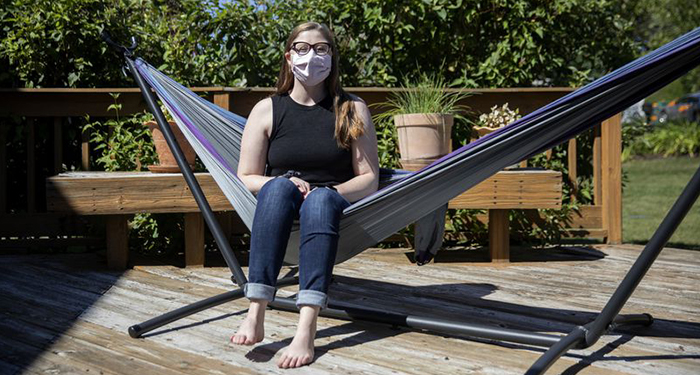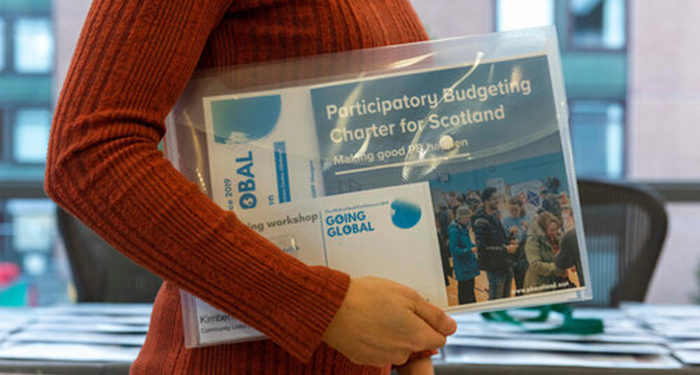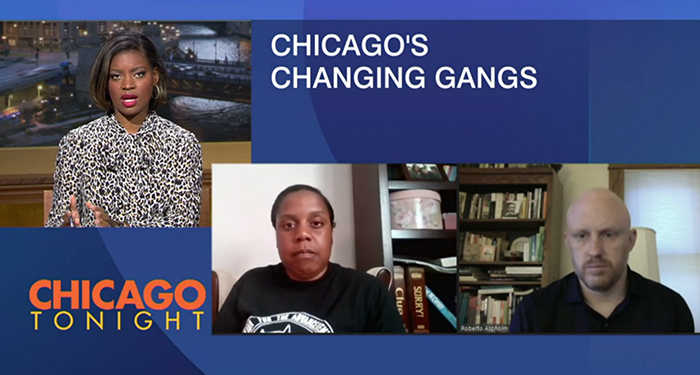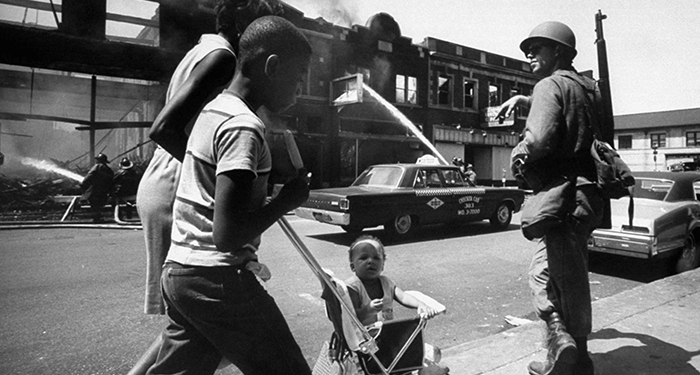Teresa Cordova, director of the Great Cities Institute and professor of urban planning and policy at UIC, is interviewed during WGN-TV News’ latest “Back to Work” segment that explores the shift some people are making from certain downtown Chicago zip codes to the suburbs or North Side neighborhoods due to the pandemic.
‘Cities have a lot of strengths right now’
In a Q&A with Crain’s Chicago Business, Teresa Córdova, director of the Great Cities Institute and professor of urban planning and policy at UIC, along with Samuel Kling, Global Cities fellow at the Chicago Council on Global Affairs, discuss the future of Chicago—and of cities in general—in a post-pandemic world. “The city is a very important place for commerce and innovation, and I don’t think that is going to change,” Cordova says.
Overworked and exhausted, warehouse workers brace for a frenzied holiday rush

(Image: The Washington Post)
The Washington Post quotes Beth Gutelius, associate director of the Center for Urban Economic Development and senior researcher at Great Cities Institute, in a story on the pressure that warehouse workers across the country have faced during the pandemic and how retailers’ holiday sales starting earlier will intensify the workload for these employees.
“We see it every year: When demand increases, so does the pressure on warehouse workers,” said Beth Gutelius, associate director of the Center for Urban Economic Development at the University of Illinois at Chicago. “This year, many workers are already operating at elevated levels because of the pandemic. Then you layer the holiday peak season on top of that, along with a surge of new hires, and there are real questions about worker safety.”
Full Story from Washington Post
Young people across the country may be moving due to COVID-19, but it’s less clear whether Chicago millennials are following suit

(Erin Hooley / Chicago Tribune)
Matthew Wilson, a senior research specialist Great Cities Institute, is quoted in Chicago Tribune story on whether or not millennials are moving from Chicago in the wake of COVID-19. Wilson points out that the data so far does not show that young people are moving out of cities, and that cities remain a strong attractor due to the availability of jobs for new college graduates.
And the city continues to attract millennials and other young adults, said Matt Wilson, a senior research specialist at the Great Cities Institute at the University of Illinois at Chicago, which researches ways to improve the city’s urban =
“They don’t have children yet typically, (and) they are fresh out of college, looking for jobs. And cities have always been the major job centers,” Wilson said. “It just seems that while Chicago’s population has declined, a lot of neighborhoods have become more dense. That density lends itself for younger people without children to live.”
People Powered – New Global Hub for Participatory Democracy

We are thrilled to announce the launch of People Powered: Global Hub for Participatory Democracy! The Great Cities Institute is a proud member of this new global organization.
People Powered’s mission is to expand people’s power to make government decisions, by supporting organizations and governments that are building participatory democracy around the world. It builds the power and impact of leaders who are championing participatory budgeting, participatory policy-making, participatory planning, citizen assemblies, and other participatory democracy programs.
The flagship program of People Powered is the Global Participatory Budgeting (PB) Hub. The Global PB Hub aims aims to improve and expand participatory budgeting (PB) around the world by addressing common challenges and opportunities faced by PB implementers and supporters. Thea Crum, Associate Director of Neighborhoods Initiative, sits on the PB Global Support Board.
Over the past several months, Thea Crum has been working with staff and other PB Global Board members to develop an Online Participatory Democracy Resource Center. The resource center consolidates PB and other participatory democracy tools, and research from around the world into an accessible, friendly, searchable, and intuitive tool where practitioners and researchers can find the resources they need to make participatory democracy processes more equitable, inclusive, and stronger. To stay up-to date, the Resource Center will on-going accept and review new tools and resources.
Visit PeoplePoweredHub.org to learn more, get the resources you need, and get involved.
Critics Say Chicago Police Need to Rethink Tracking Gang Members, Curbing Violence

Roberto Aspholm, one of the authors of GCI’s report The Fracturing of Gangs and Violence in Chicago, is quoted in a WTTW Chicago Tonight story on the need to change the police departments response to gangs and violence in Chicago.
“When you look at the 1980s and 1990s, the era of the corporate, hierarchical street gangs in the city of Chicago, today we have a very different scenario with a very fragmented, fractured gang landscape,” said Roberto Aspholm, author of “Views From the Streets: The Transformation of Gangs and Violence on Chicago’s South Side” and an assistant professor of social work at the University of St. Thomas.
“The notion that the neighborhood groups today represent factions of these larger organizations, I don’t think it is really an accurate assessment of what’s going on,” Aspholm said. “These are really independent, neighborhood-based groups that don’t exist in relation to any broader hierarchy or cross-neighborhood formal coalition.”
Celebrating Juneteenth with our Elders
Thanks to efforts from Aldermen Maria Hadden and David Moore, the City of Chicago, will now commemorate Juneteenth, the day in 1865, when troops rode into Galveston, Texas to enforce the Emancipation Proclamation, which had been declared two years earlier. Hadden and Moore’s efforts began in November 2019 when they sought an ordinance to declare Juneteenth an official holiday. Though it will not be a paid holiday, on Wednesday, June 17, 2020, Aldermen Hadden and Moore succeeded in obtaining all but two of City Council votes in favor of the observance of June 19 in the City of Chicago. Congratulations!
As part of this year’s commemoration, Great Cities Institute would like to share interviews of a handful of our esteemed friends, speaking on issues of race and inequality and urban redevelopment. These interviews were conducted on March 1, 2018 but we are posting them now for the first time.
We call your attention in particular to the interviews of elders Timuel Black, Eugene “Gus” Newport and Fred Harris. In addition, Gail Cristopher and JR Fleming have much to add to the wealth of wisdom contained in these interviews.
Here is some biographical information on the interviewees.
Timuel Black is a civil rights activist, educator, and historian. Born in Birmingham, Alabama, Mr. Black grew up in Chicago’s Bronzeville neighborhood. After serving in World War II and completing his Master’s degree at the University of Chicago, Mr. Black was influential in bringing Dr. Martin Luther King, Jr. to Chicago for Dr. King’s first major speech in the city. In the years following, Mr. Black organized the Freedom Trains which carried thousands of Chicago residents to the 1963 March on Washington, and later became an influential political organizer and supporter in Harold Washington’s successful mayoral campaign.
Mr. Black spent many years as an educator and administrator in Chicago Public Schools and the City Colleges of Chicago, where he focused his efforts on ending segregation within these institutions. He challenged the Daley political machine in a 1963 City Council campaign, introducing the term “plantation politics” into national discourse. Mr. Black was also influential in Former President Barack Obama’s work as a Chicago community organizer, and in 2014 joined the Community Advisory Board of the Barack Obama Presidential Library.
In recent years, Mr. Black has interviewed hundreds of African Americans on Chicago’s south side to assemble Bridges of Memory, an oral history of the Great Migration and African American life in Chicago. Mr. Black is also in the process of writing his autobiography, entitled Sacred Ground in reference to the spirituality and community of Chicago’s south side.
Eugene “Gus” Newport is a civil rights activist and the former mayor of Berkeley, California. Mr. Newport began his political career in his hometown of Rochester, New York in the 1960’s as chairman of the Monroe County Non-Partisan Political League, which focused on issues surrounding police brutality, workplace discrimination, and voter registration. He served as mayor of Berkeley from 1979 to 1986.
As an activist for nonviolence, Mr. Newport served as the Vice President from the United States to the World Peace Council from 1980 to 1986, and also served on the United Nations’ Committee Against Apartheid and Committee on the Question of Palestine. While serving as Program Director of the Vanguard Foundation, he worked as a consultant to the Louisiana Disaster Recovery Foundation following Hurricane Katrina, and focused his efforts on community planning, organizing, and policy change during the disaster recovery efforts.
Mr. Newport has served as Director of the Institute of Community Economics; the Community Building Support Center for the Urban Strategies Council; and several Neighborhood Initiatives in Florida and Massachusetts. Notably, he was the Executive Director of the Dudley Street Neighborhood Initiative from 1988-1992, where he oversaw the organization’s collaborative vision for housing, safety, arts and culture, employment, and youth empowerment in Boston’s Roxbury and North Dorchester neighborhoods. He has also been an Advisory Board member of the Committees of Correspondence for Democracy and Socialism and the U.S. Conference of Mayors. Additionally, Mr. Newport has served as a Faculty member, Fellow, and Lecturer-in-Residence at numerous universities, including Yale, the University of Massachusetts – Boston, and the University of California – Santa Cruz. In 2006, he was an MLK Scholar at MIT’s Department of Urban Studies and Planning, where he led graduate coursework in planning for disenfranchised urban communities.
Former U. S. Senator Fred Harris is a widely published author, professor emeritus of political science at the University of New Mexico, and now the only surviving member of President Lyndon Johnson’s National Advisory Commission on Civil Disorders, more commonly known as the Kerner Commission. Appointed partly at Harris’s suggestion following the terrible riots in the African American sections of many American cities during the summer of 1967, the Kerner Commission famously found (March 1, 1968) that “Our nation is moving toward two societies, one white, one black, separate and unequal.”
In addition to his two terms as a U.S. Senator, Fred Harris served as National Chair of the Democratic Party in 1969 and 1970, a role in which he reformed the party to increase true democracy and expand representation of women and minorities. After leaving the Senate, Fred Harris became a highly popular UNM political science professor, and was named Outstanding Faculty Member (UNM Alumni Association) and Best Professor (UNM student newspaper) in 2001. Mr. Harris has been a Fulbright Scholar in Mexico; a visiting professor at the Universidad Nacional Autónima de México (UNAM), Mexico’s national university; and has taught and lectured extensively throughout Latin America, Europe, and Asia.
Mr. Harris has produced 19 nonfiction books on politics, government, and policy, including The New Populism and Quiet Riots: Cities, Race, and Poverty in the United States. He is the co-editor (with Alan Curtis) of the 2018 book Healing Our Divided Society, a fiftieth-anniversary update of the 1968 Kerner Report. Harris continues to be a citizen and political activist, both at the national level (as a former member of the National Governing Board of Common Cause and former Chairman of the Eisenhower Foundation) and in New Mexico (as a former NM State Chair of the Democratic Party, former chair of Common Cause NM, and Chair of NM Voices for Children).
Dr. Gail C. Christopher is an award winning social change agent and former Senior Advisor and Vice President of the W. K. Kellogg Foundation (WKKF), one of the world’s largest philanthropies.
She is the visionary for and architect of the WKKF led Truth Racial Healing and Transformation (TRHT) effort for America. TRHT is an adaptation of the globally recognized Truth and Reconciliation Commission (TRC) model. TRHT evolved from the decade long WKKF America Healing, racial equity and racial healing initiative, designed and led by Dr. Christopher. Over the last ten years she has had responsibility for several other areas of foundation programming. These include, Food, Health and Well-Being, Leadership, Public Policy, Community Engagement and place-based funding in New Orleans and New Mexico.
In August of 2017, Dr. Christopher left her leadership position with WKKF to launch the Maryland based Ntianu Center for Healing and Nature; and to devote more time to writing and speaking on issues of health, racial healing and human capacity for caring. She is currently Chair of the Board of the Trust for America’s Health and a Fellow of The National Academy of Public Administration.
Willie “J.R.” Fleming is a seasoned community leader and human rights defender, with a focus on housing rights. He is the co-founder and current Executive Director of the Chicago Anti-Eviction Campaign (AEC). His activism and organizing work began with the devastating impacts of the demolition of public housing on his community. Organizing with groups such as the Chicago Coalition to Protect Public Housing, the Centre on Housing Rights and Evictions, and the Hip Hop Congress, J.R.’s dedication to enforcing human rights grew. In 2009, he served as the Chicago City Chair for the UN Human Right to Adequate Housing’s official mission to the United States.
Shortly after, he co-founded the Chicago Anti-Eviction Campaign. In the AEC’s first year alone, the organization built a dynamic city-wide Human Right to Housing Collective, consisting of CHA tenants and families facing foreclosure. Their work grew nationally and they helped guide the Campaign to Restore National Housing Rights, serving as founding members of its Steering Committee. At the state level, the AEC also won a temporary moratorium on “economically motivated” evictions in Cook County. The AEC helped tenants living in foreclosed properties to stay in their homes by coordinating with banks to donate homes to churches in the community. As Executive Director of the AEC, JR helps to coordinate foreclosure assistance and trainings with homeowners, tenants, community groups, and churches.
J.R. is also a national advocate for the Women’s Ex-offender Re-entry Program (CHA and HUD), has been involved in several successful eviction defenses, and was the recipient of the 2013 U.S. Human Rights Builders Award.
The Chicago Reentry Report
Authors
Timothy O. Imeokparia, Ph.D., AICP, Associate Director of Research and Planning
Abstract
Approximately 97 percent of incarcerated individuals in the U.S. will eventually be released and return to their communities – whether released on probation, parole, or unconditionally discharged. That is, out of the Illinois’ 38,259 prison population (as of December 31, 2019), 36,346 will at some point be released, varying by sentencing guidelines.
However, criminal justice contact and incarceration stigmatizes and results in substantial social and economic costs such as constraints on employment, housing, voting, and welfare benefits, in addition to enduring effects on physical and mental health. This is compounded by the collateral consequences, such as legal and regulatory sanctions, of incarceration. Even if not incarcerated, many with criminal records will find themselves deprived of certain rights and stripped of opportunities for housing, education, employment, social services, and other necessities. All of this increases the likelihood of return to criminal activity.
The process of reentry is one with many challenges and an often-difficult one to navigate. Studies suggest that those reentering the community will again be incarcerated at fairly high rates. This is a measure of both the extent to which reentering individuals face impediments to successful reentry as well as the resources available to reentry service providers to support the reentry population in surmounting these obstacles.
Managing reentry to accomplish long-term reintegration has wide-ranging benefits for former prisoners, their families and the impoverished neighborhoods most impacted by reentry.
The ability to meet the demand and complex needs of the reentry population, however, is significantly vitiated by the impoverished and discontinuous make-up of the reentry infrastructure, which is severely under built and underfunded and therefore, inadequate to the task of enabling the successful reentry of the formerly incarcerated, resulting in difficulties for many individuals returning to the community from prison or jail.
It is of significant importance that issues facing reentry populations and their families and communities be addressed through a concerted policy and programmatic focus that also requires an examination of how the problem is created in the first place.
While urgent, addressing these issues is made more difficult by the complexity of the reentry phenomenon. The goal of this report is to increase understanding of re-entry and to inform the development of and to advocate for specific policy initiatives and programs that address re-entry by examining the issues and challenges surrounding prisoner reentry in the city of Chicago. By reviewing existing studies and the best available data, this report attempts to provide a more systematic understanding of the complexities and problems attendant with prisoner reentry – as both a concept and a practice. It is intended to contribute to ongoing efforts by various stakeholders in the city to increase the possibilities for successful prisoner reintegration.
Where do we go from here?

Detroit, July 1967. Source: Lee Balterman—Time & Life Pictures/Getty Images
In light of the recent protests and outrage against the killing of George Floyd by a Minneapolis policeman as well as continuing police brutality, especially in black communities, we are reminded both of the Kerner Commission Report and the March 2018 Great Cities Institute event to commemorate the 50 years since its release.
In the aftermath of the 1967 urban ‘riots’, President Lyndon B. Johnson established the National Advisory Commission on Civil Disorders, known as the Kerner Commission after its chair, Governor Otto Kerner, Jr. of Illinois. The 11-member commission examined the conditions of the cities that led to the turmoil and made recommendations addressing the underlying causes. The Commission’s report, released on February 29, 1968, marks a pivotal moment in the changing dynamics of U.S. cities and of critical analysis of the role of race as a division in America.
As part of the work of the Commission, members went to communities where the ‘riots’ had occurred, talked to people and saw conditions firsthand. A group of young males in Milwaukee, for example, said to them, “Get us a job, baby; we need jobs, baby.” The issue of jobs became “a central theme in our findings and recommendations,” said Fred Harris, the last remaining member of the Commission who was the keynote speaker at the Great Cities Institute event. As the former Oklahoma Senator shared stories of how the Kerner Commission came about, he also highlighted some of its findings:
Our basic and most famous finding was “our nation is moving toward two societies one black one white – separate and unequal.”
The report stated further “segregation and poverty have created in the racial ghetto a destructive environment totally unknown to most white Americans,’ and added ‘what white Americans have never fully understood but what the Negro’ – as we said it – ‘but what the Negro can never forget is that white society is deeply implicated in the ghetto. White institutions created it, white institutions maintain it and white society condones it.”
“Great and sustained national efforts were required” we said, “not only to combat racism but also to greatly expand social programs including those against unemployment and low wages, poverty, inferior or inadequate education and training, lack of healthcare, and bad or nonexistent housing.”
The report also made strong recommendations for improving the conduct of the media and the police and for needed integration of housing and schools. These recommendations applied to all Americans, ‘rural and urban, white, black, Spanish surname as we said then American Indians and all minorities.
But unfortunately misinformed about its content and distracted by the Vietnam war President Johnson rejected the current report.
Senator Harris also discussed conditions since the report and suggested strategies that are known to work.
Some improvement has occurred…but regression has been the trend since the mid-1970s and that’s true today. There is still far too much excessive force by police; too often deadly force, especially against African Americans. White supremacists have become bolder and more violent. Housing and schools have been rapidly re-segregated locking too many African Americans and Latinos into slums and their children into inferior schools.
As the nation has grown, as our overall poverty rate has stubbornly remained virtually the same percentage rate while the total number of poor people in America has increased from a little over 25 million to a little over 40 million by 2016.
Ever since the 1970s, the African American unemployment rate has continued to be about double that for whites and Latino unemployment continues high as well.
Labor union membership has shrunk from about 25 percent of private jobs to about 6 percent.
Inequality of income in our country has greatly worsened. In the 1970s, for example, the richest 1 percent of Americans took home something less than 9 percent of total national income, but by 2016, they took home 24 percent.
Fifty two percent of all new income in America has gone to the top 1 percent.
Rich people are healthier and live longer. They get a better education and a better education produces more inequality of income. That greater economic power translates into greater political power.
So where do we go from here?
We know what to do and we know what works:
A more progressive tax system making rich people and big corporations pay their fair share
Stopping tax and spending subsidies that redistribute wealth and income in the wrong direction
Strengthening unions and removing the legal or other barriers, which impedes the right of workers to organize
Raising the minimum wage to a living wage, which would be a giant boost to the economy and bump up middle class wages too.
We need more affordable housing, and housing and schools integrated by income and race.
We also need re-regulation of big banks and big finance.
Better incomes for those who can’t work; and who can’t find work
A sound, free public education for all from early childhood through college
Education and training with special attention to those put out of work by circumstances beyond their control
Health-care for all
The basic American principles of equal rights and equal opportunity for all whatever their social standing, income, zipcode, gender or color
Investment in infrastructure, in science and alternative energy, technology, investment in ourselves
“How can we get these things done when political times are so tough,” he asks. He goes on to talk about the things in which we can take heart including the legacy of courageous individuals who fought for civil rights and “persisted and prevailed” and in the fact that polls show that the majority of Americans support “those policies that we must now adopt.” He also states,
We can take heart that we live in a time of unprecedented, growing and powerful people’s activism.
And quoting Reverend Barber of North Carolina he says,
“We can’t keep fighting in our silos. No more separating issues…The same people fighting one of us, should have to fight all of us together.
And so we find ourselves in a time when our very survival – our democracy, our ability to live in health reaping the wealth of our labor, and indeed our ability to live on this planet – all depend on all of us coming together to bridge the gap between our espoused principles with the realities of our conditions.
Please revisit the video – filmed by public access television, CANTV – to view the Great Cities Institute commemoration of the 50th Anniversary of the release of the National Advisory Commission on Civil Disorders’ Kerner Commission Report.
Following the presentation by Senator Harris was a panel discussion with noted historian and Chicago civil rights activist Timuel Black who was joined by former mayor of Berkeley and human rights activist Eugene “Gus” Newport, former vice president of the W K Kellogg Foundation, Dr. Gail Christopher. Also included on the panel were local activists and community builders: José Lopez of the Puerto Rican Cultural Center, Willie J.R. Fleming of the Chicago Anti-Eviction Campaign, and Anthony Lowery of the Safer Foundation. It is a remarkable panel filled with fodder for our continuing conversation on where we go from here.
Chicago Is About to Have a Lot More Balconies

The River Bank Lofts, as pictured from the Chicago River. PHOTO: EYFOTO / ISTOCK via Chicago Magazine
Sanjeev Vidyarthi, UIC associate professor of urban planning and policy and a senior fellow of the Great Cities Institute, is quoted in a Chicago magazine article about the social and architectural function of balconies in the city and the history of their growing demand, particularly during the coronavirus stay-at-home order. Despite their added cost, more Chicago developers will likely make balconies the standard in new buildings, according to Vidyarthi.
“This remarkable moment in time has forced all of us to rethink the physical space we inhabit and it’s showing what a great feature the balcony is,” says Dr. Sanjeev Vidyarthi, an associate professor of urban planning and policy and a senior fellow of the Great Cities Institute at the University of Illinois at Chicago.
